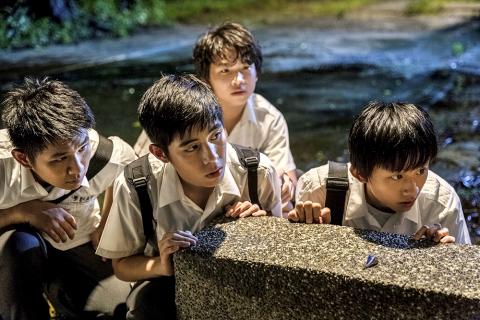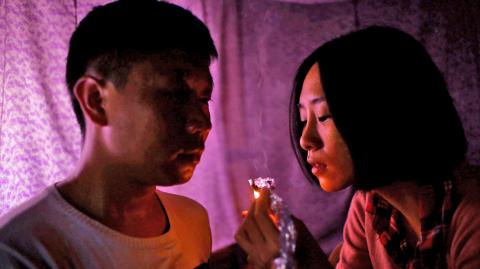This year has seen a diversity of movies, with crafted genre flicks, films exploring the nation’s past and present and new works by established masters and emerging auteurs.
FEATURE FILM
Entertainment and history, for example, are intricately woven together in Yeh Tien-lun’s (葉天倫) Twa Tiu Tiann (大稻埕), a melodramatic comedy that looks back at the country’s past through the story of a young man traveling back in time to 1920s Taiwan, when the country was under Japanese colonial rule.

Photo courtesy of Hung Chun-hsiu
The same era is seen from a different perspective in Kano, which offers an optimistic take on Taiwan’s history, culture and identity through a sport that was introduced into the nation by Japan. Focusing on a high-school baseball team from Chiayi that wins respect at Japan’s prestigious national high school baseball championship in 1931, the film is not only as enthralling as a great underdog success story, but a grand audio-visual portrait of the relationship between Taiwan and Japan, designed to elicit big emotions.
Undeservedly underrated, It Takes Two to Tango (車拚) is the latest work by Wan Jen (萬仁), an important figure of the Taiwanese New Wave, which looks into the tangled relationship between Taiwan and China through a comedy about a couple separated by the Taiwan Strait. Unlike his contemporaries Hou Hsiao-Hsien (侯孝賢) and Edward Yang (楊德昌), Wang adopts a populist approach to filmmaking and is noted for an oeuvre that explores Taiwanese identity.
Meanwhile, drug abuse, poverty, land expropriation and other problems faced by rural communities are examined in an articulate and accessible manner in writer-director Lou Yi-an’s (樓一安) The Losers (廢物). A sense of defeat pervades the film, whether it is depicting the life of an aging farmer, Southeast Asian immigrant, disillusioned youth or an Aboriginal resident, unnamed and unrecognizable on her own land. But Lou deals with this raw anger intelligently, using dark humor to examine injustice and oppression. It mocks and makes the unbearable absurd and comic, while adorning the characters and their struggles with a new sense of warmth.

Photo courtesy of Vie Vision Pictures
Inspired by the traumatic events of Typhoon Morakot, Kuo Chen-ti’s (郭珍弟) The Boar King (山豬溫泉) tells a deceptively quiet story of loss and rebirth, looking at human suffering and pain with considerable restraint. Solid performances by veteran actors Lu Yi-ching (陸弈靜) and Tsai Chen-nan (蔡振南) help bring out these themes.
An expressive comedy about a group of teenage boys and their whimsical plans to address their poverty, veteran director Yee Chih-yen’s (易智言) Meeting Dr. Sun (行動代號:孫中山) casts a lyrical and vigorous look into Taiwan’s social inequality through the eyes of the young. Alternating between farcical humor and emotional acuteness, the film is more fable than drama, approaching the complex social problems with lucid simplicity.
From the domain of genre cinema, up-and-coming genre director Lien Yi-chi (連奕琦) hands in Sweet Alibis (甜蜜殺機), a neatly executed suspense and police comedy that delivers finely crafted humor and makes brilliant use of its well-chosen cast led by Taiwanese actors Ariel Lin (林依晨) and Alec Su (蘇有朋) as the buddy cop duo. School bullying and adolescent angst are among the elements of suspense in Chang Rong-ji’s (張榮吉) second feature Partners in Crime (共犯), while Chen Hung-i (陳宏一) gives comedy a try in Design 7 Love (相愛的七種設計), an urban romantic drama about a group of beautiful people living in Taipei.

Photo courtesy of Activator Marketing Company
DOCUMENTARY
In the documentary realm, Hung Chun-hsiu’s (洪淳修) award-winning The Lost Sea (刪海經) sheds light on the horseshoe crab, a marine species that has lived on earth for more than 200 million years. Once thriving on the outlying island of Kinmen, The population of these living fossils has disappeared, along with the traditional way of life for the islet’s fishermen. Construction of the Shuitou Commercial Port (水頭商港), launched in 1996 by the Kinmen government in the hope of wooing Chinese tourists, has destroyed fishing grounds and devastated the ecosystem.
Intelligently crafted and emotionally engaging, the documentary is commendable in its ability to go beyond environmental and conservation issues, employing the dramatic life-and-death struggle of the ancient creature as a potent symbol of the island’s turbulent past and present.

Photo Courtesy of Good Day Films
Myanmar-born, Taiwan-based new auteur Midi Z (趙德胤) continues his examination of social and economic hardships in contemporary Myanmar with Ice Poison (冰毒), a tender portrait of displaced individuals trapped in perpetual poverty. A debut feature by accomplished cinematographer Chien Hsiang (錢翔), Exit (迴光奏鳴曲) recalls Tsai Ming-liang’s (蔡明亮) early works in its quiet exploration of the mind of a lone, middle-aged woman played by Chen Shiang-chyi (陳湘琪), who won the best lead actress honor for her performance in the film at this years’ Golden Horse Awards.
Last but by no means least, Taiwan’s pride and joy Tsai Ming-liang turns in his new art-house work, Stray Dogs (郊遊), which eschews narrative and features Lee Kang-sheng (李康生) as a single father trying to earn a living by holding up advertisement signs on the streets for a real-estate development company, and Chen Shiang-chyi (陳湘琪) gazing at a large mural by Taiwanese artist Kao Jun-honn (高俊宏) inside a deserted building.

Photo courtesy of Swallow Wings Films

Photo courtesy of Activator Marketing Company

Photo Courtesy of Good Day Films

Photo courtesy of Flash Forward Entertainment

Taiwan has next to no political engagement in Myanmar, either with the ruling military junta nor the dozens of armed groups who’ve in the last five years taken over around two-thirds of the nation’s territory in a sprawling, patchwork civil war. But early last month, the leader of one relatively minor Burmese revolutionary faction, General Nerdah Bomya, who is also an alleged war criminal, made a low key visit to Taipei, where he met with a member of President William Lai’s (賴清德) staff, a retired Taiwanese military official and several academics. “I feel like Taiwan is a good example of

March 2 to March 8 Gunfire rang out along the shore of the frontline island of Lieyu (烈嶼) on a foggy afternoon on March 7, 1987. By the time it was over, about 20 unarmed Vietnamese refugees — men, women, elderly and children — were dead. They were hastily buried, followed by decades of silence. Months later, opposition politicians and journalists tried to uncover what had happened, but conflicting accounts only deepened the confusion. One version suggested that government troops had mistakenly killed their own operatives attempting to return home from Vietnam. The military maintained that the

Jacques Poissant’s suffering stopped the day he asked his daughter if it would be “cowardly to ask to be helped to die.” The retired Canadian insurance adviser was 93, and “was wasting away” after a long battle with prostate cancer. “He no longer had any zest for life,” Josee Poissant said. Last year her mother made the same choice at 96 when she realized she would not be getting out of hospital. She died surrounded by her children and their partners listening to the music she loved. “She was at peace. She sang until she went to sleep.” Josee Poissant remembers it as a beautiful

Before the last section of the round-the-island railway was electrified, one old blue train still chugged back and forth between Pingtung County’s Fangliao (枋寮) and Taitung (台東) stations once a day. It was so slow, was so hot (it had no air conditioning) and covered such a short distance, that the low fare still failed to attract many riders. This relic of the past was finally retired when the South Link Line was fully electrified on Dec. 23, 2020. A wave of nostalgia surrounded the termination of the Ordinary Train service, as these train carriages had been in use for decades